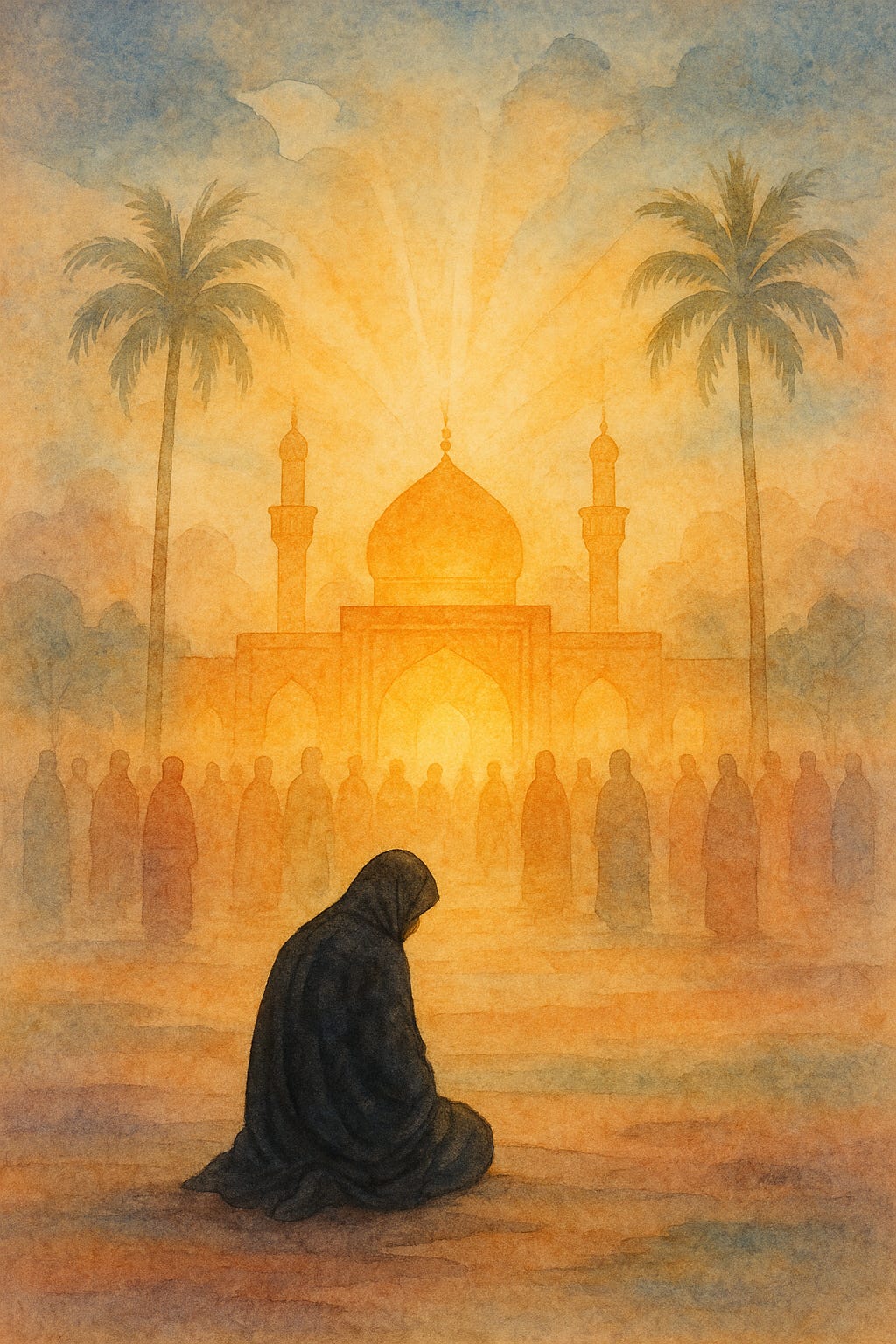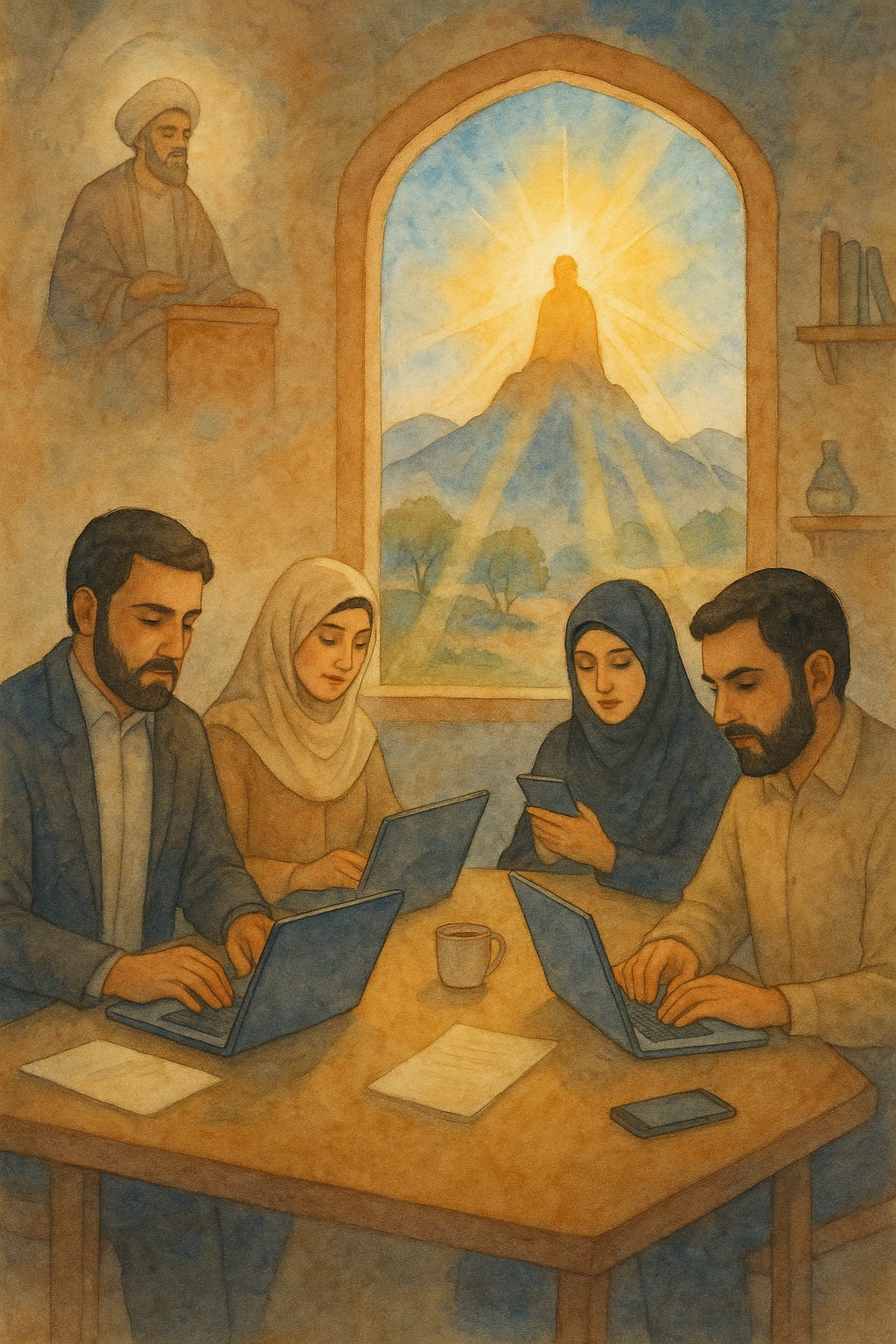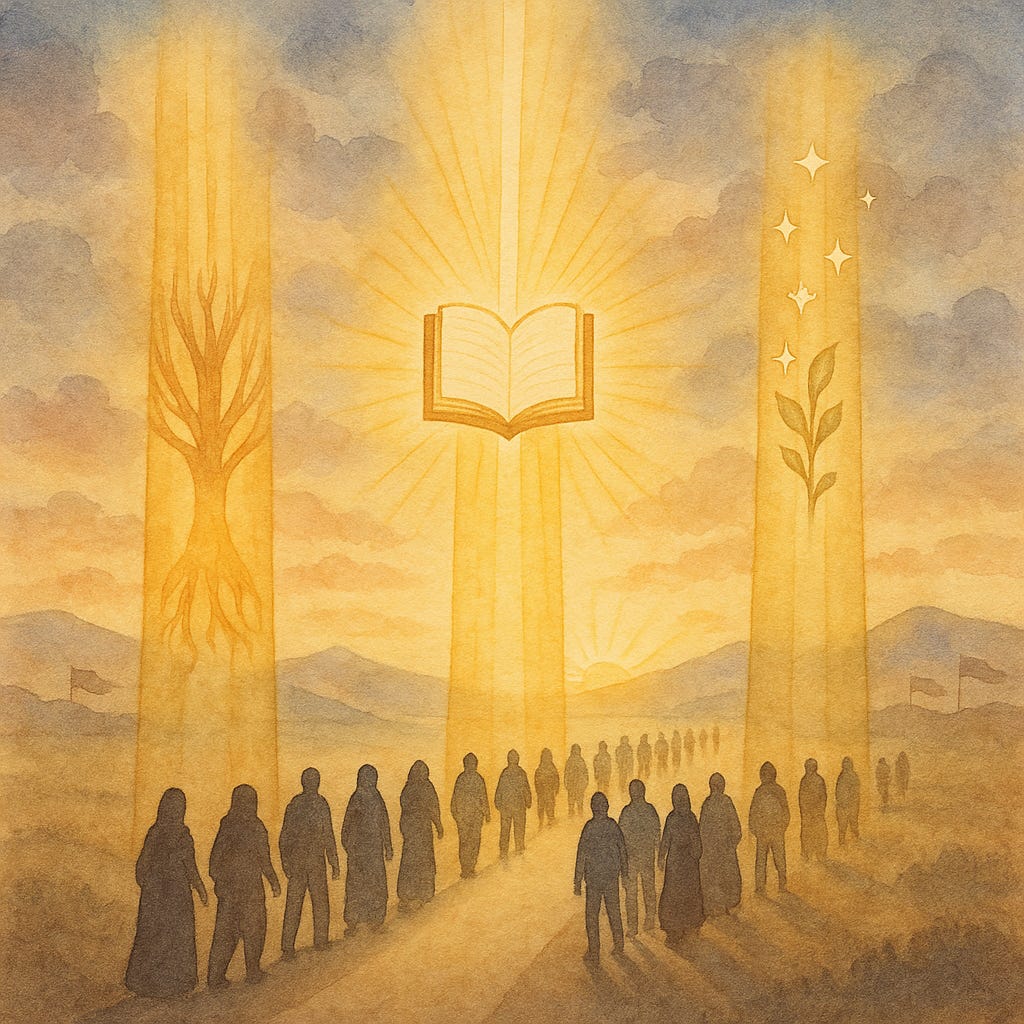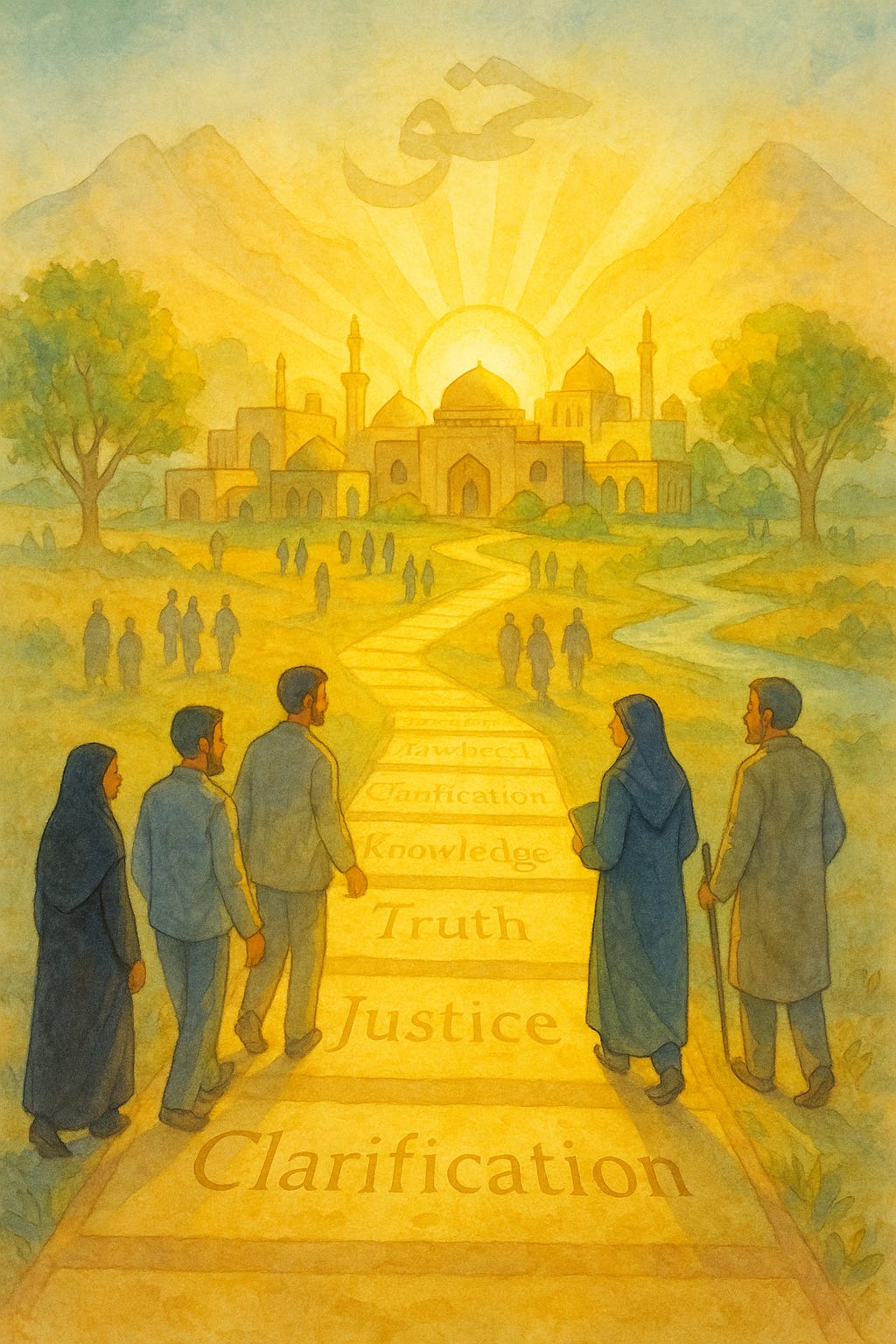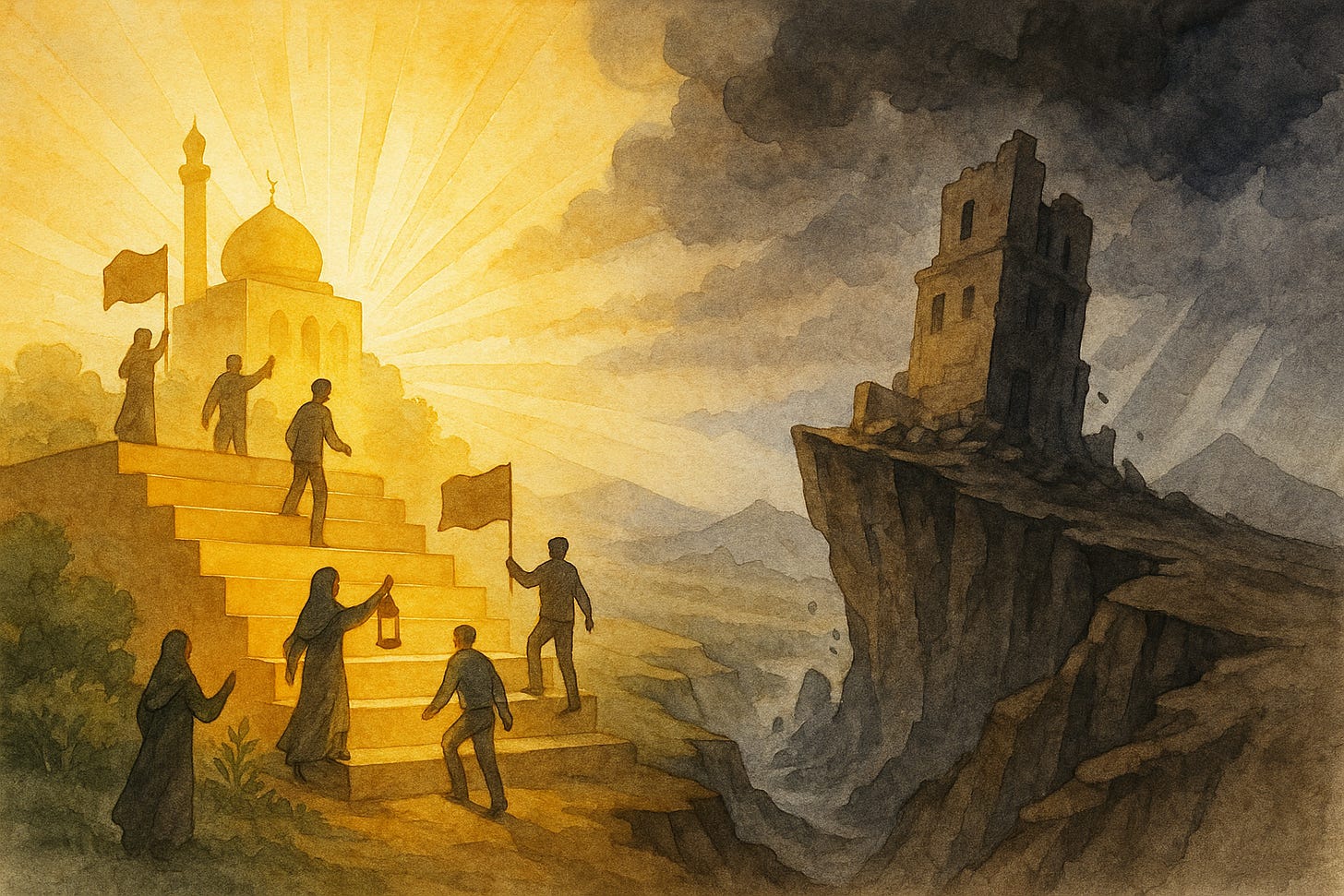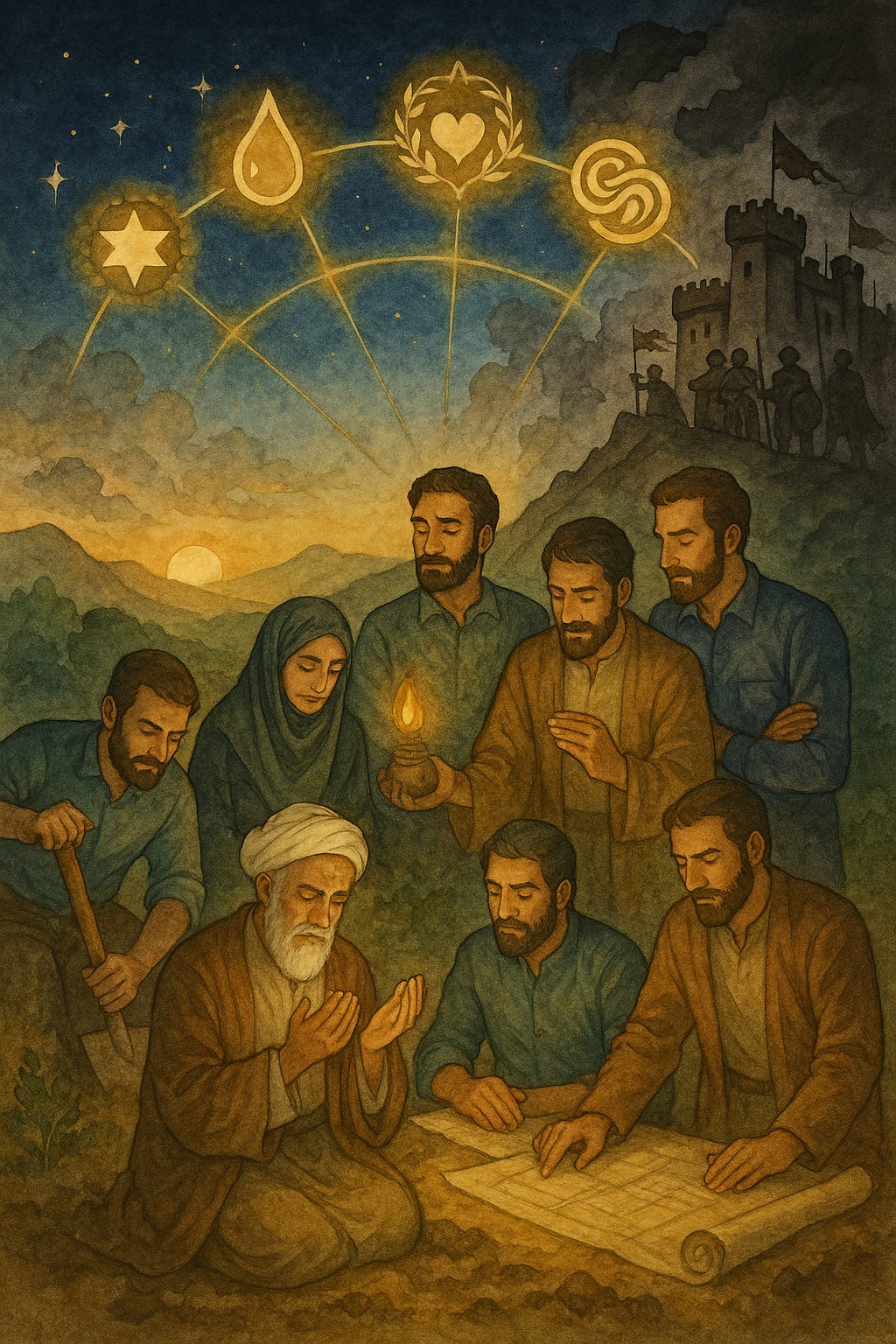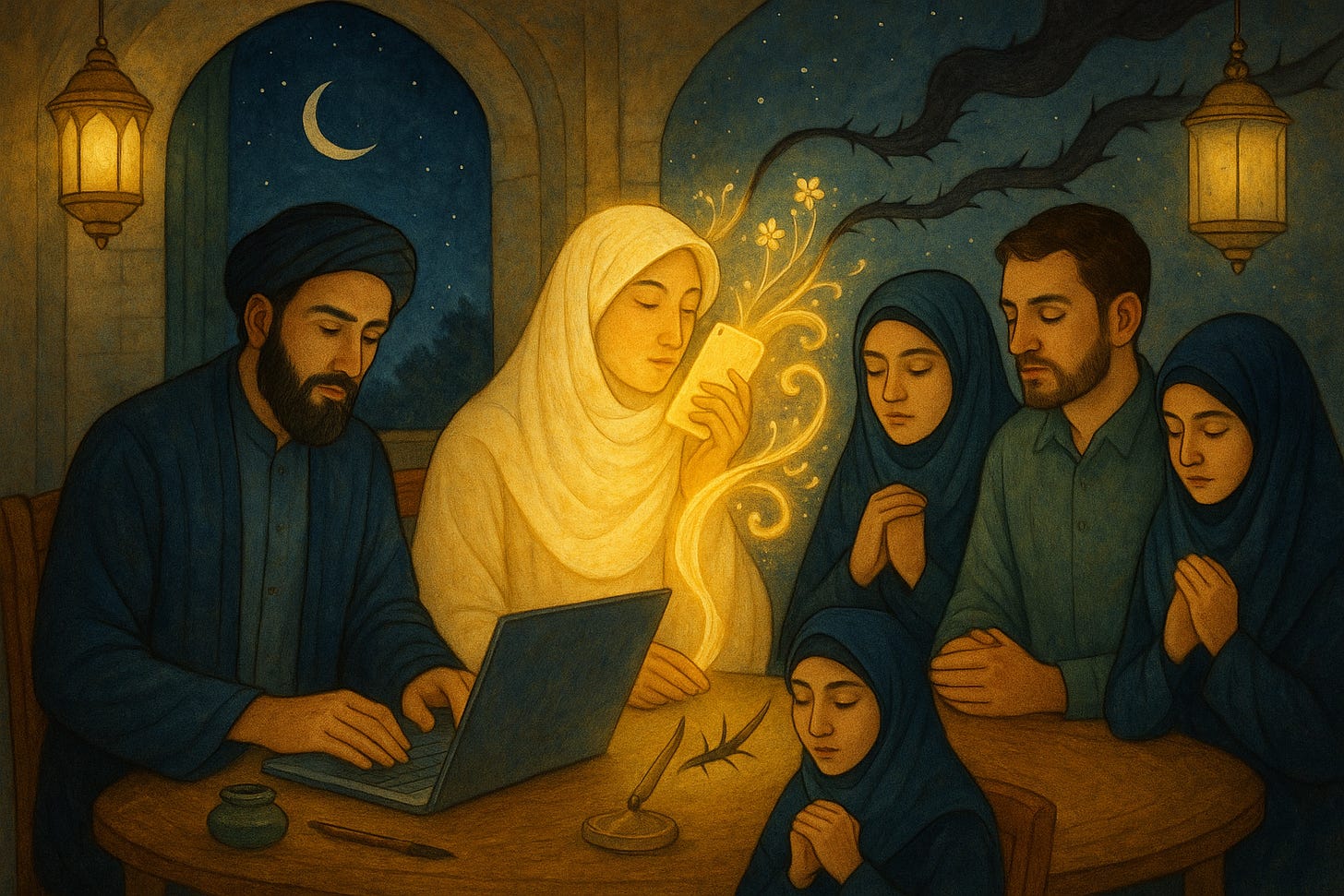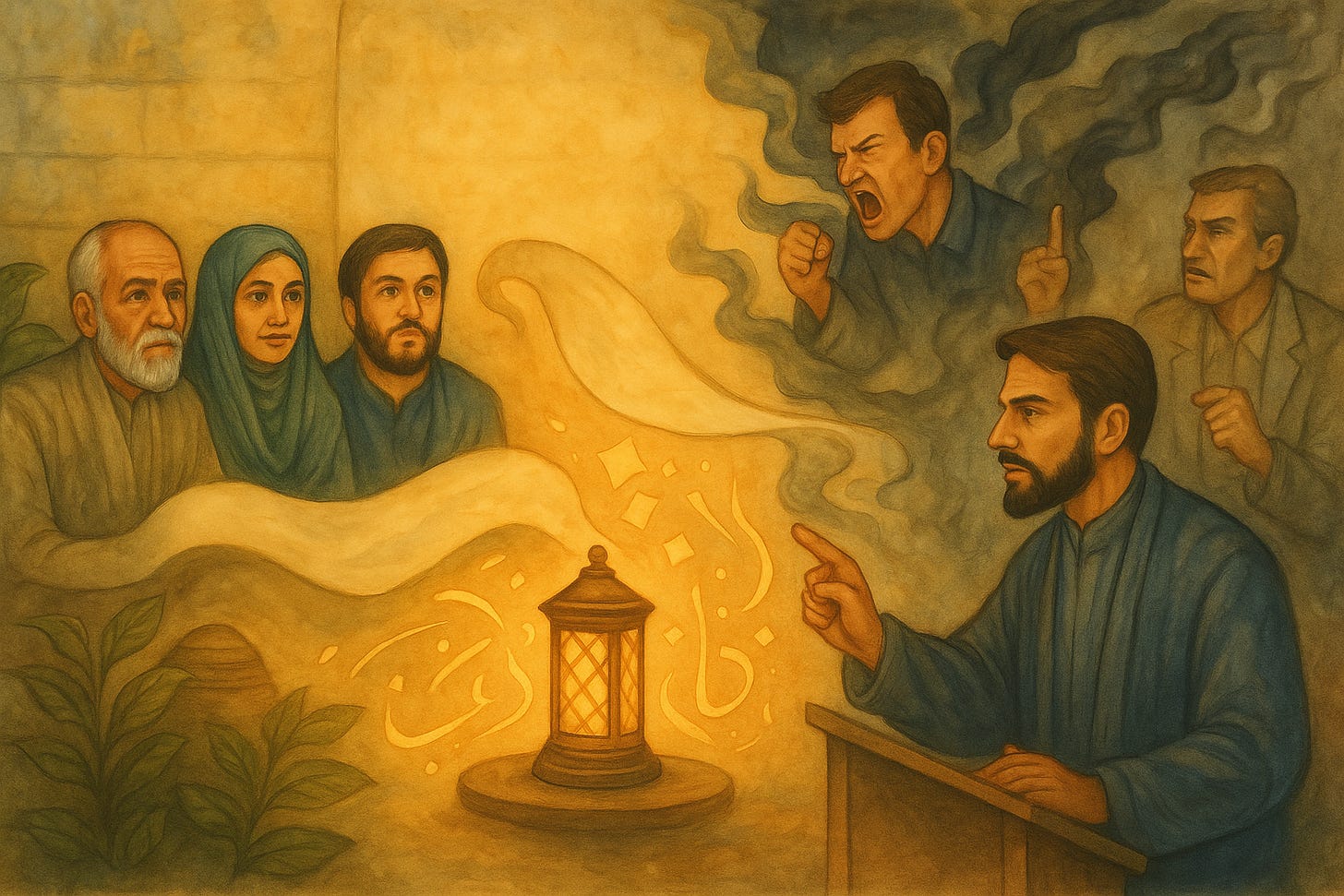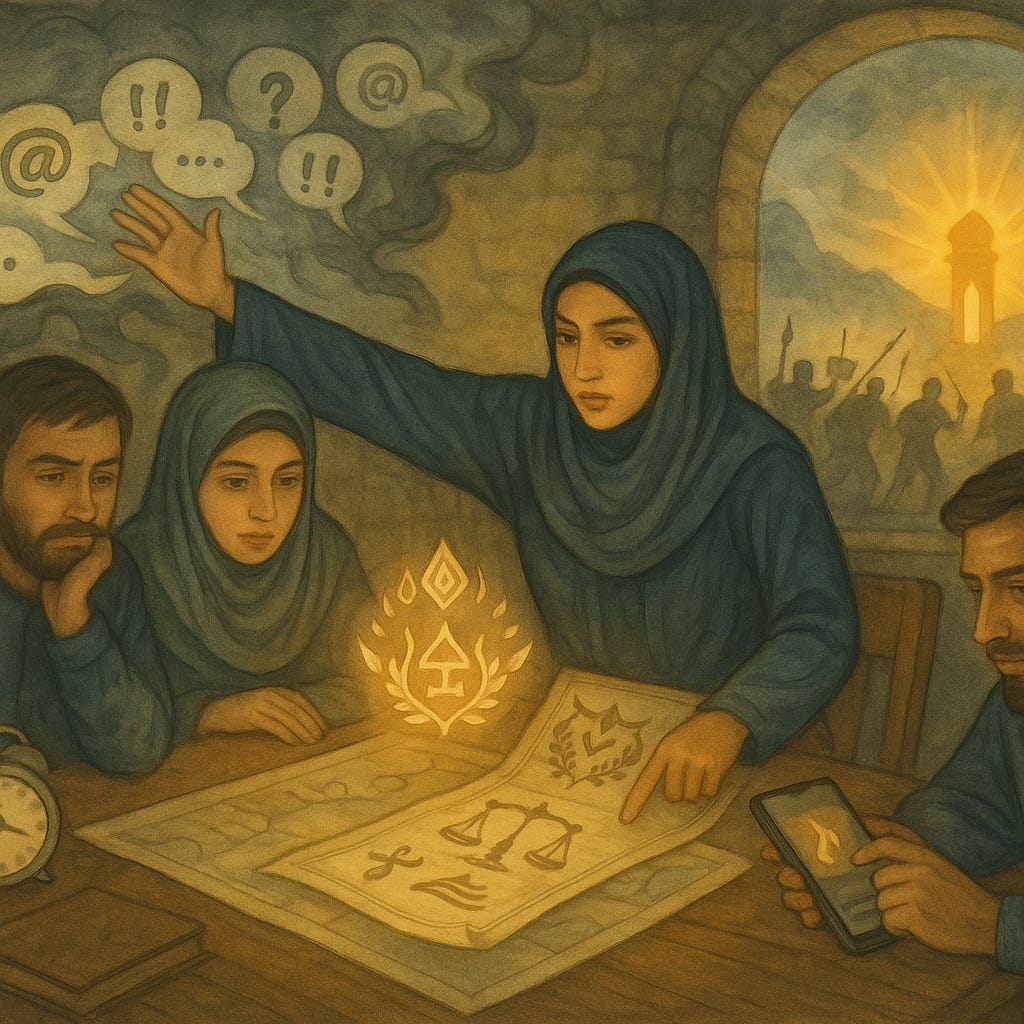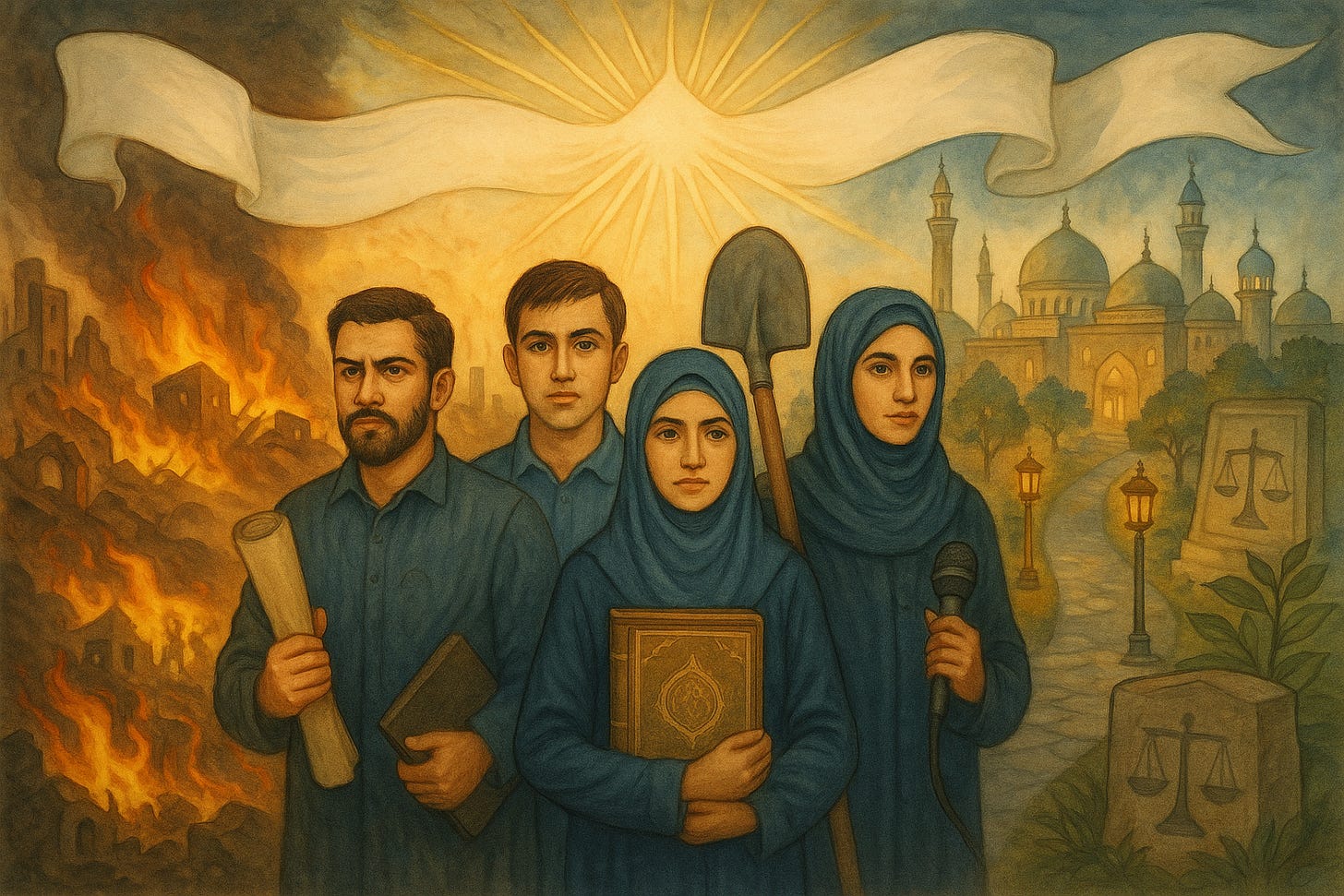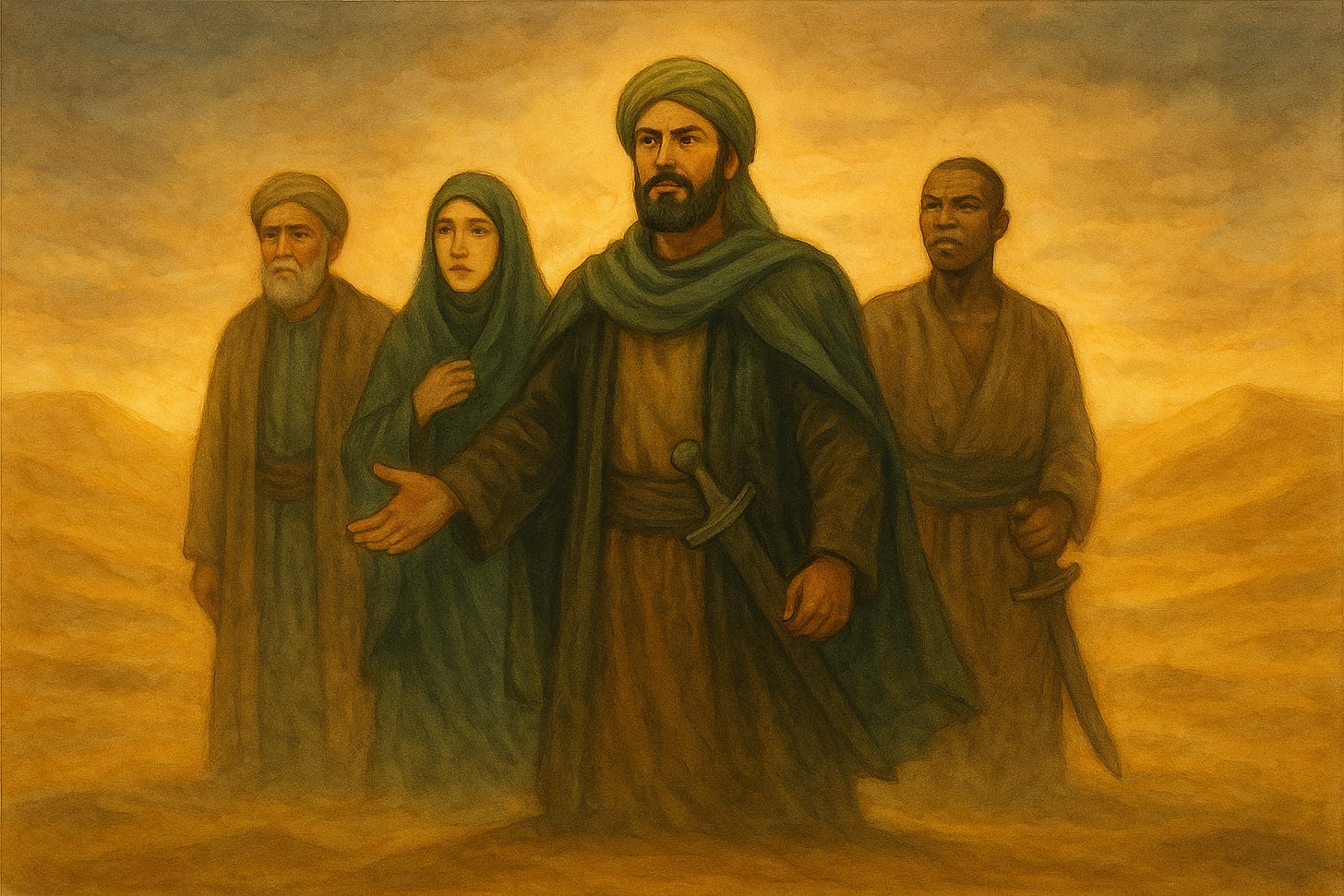[4] Tabyeen (Clarification) - The Requirements of Clarification - Part 1
A series of discussions on the notion of clarification; critical within Islam and Islamic thought. This series is based on lectures delivered by Imam Khamenei. These sessions are for Ashura 2025/1447
In His Name, the Most High
اَلسَّلاَمُ عَلَيْكَ يَا أَبَا عَبْدِاللَّهِ
وَعَلَى الْأَرْوَاحِ الَّتِي حَلَّتْ بِفِنَائِكَ
عَلَيْكُمْ مِنَّا جَمِيعًا سَلاَمُ اللَّهِ أَبَدًا مَا بَقِينَا وَبَقِيَ اللَّيْلُ وَالنَّهَارُ
وَلا جَعَلَهُ اللَّهُ آخِرَ الْعَهْدِ مِنَّا لِزِيَارَتِكُمْ
اَلسَّلاَمُ عَلَى الْحُسَيْنِ
وَعَلَى عَلِيِّ بْنِ الْحُسَيْنِ
وَعَلَى أَوْلَادِ الْحُسَيْنِ
وَعَلَى أَصْحَابِ الْحُسَيْنِPeace be upon you, O Aba Abdillah (O Husayn),
and upon the souls who have gathered in your courtyard.
Upon you, from us all, is the peace of God—forever,
for as long as we remain and as long as night and day endure.
And may God never make this our last pledge to visit you.Peace be upon al-Husayn,
and upon Ali, son of al-Husayn,
and upon the children of al-Husayn,
and upon the companions of al-Husayn.—Adapted from Ziyarat Ashura1
Introduction
This is the fourth in our series of sessions, for the nights of Ashura and Arbaeen, on the subject of Tabyeen (or clarification).
As with our other sessions - such as those on Patience, the Lantern of the Path or on the Art of Supplication - it is strongly recommended that the reader, at the very least review the previous sessions prior to consuming this one.
This is because of the nature of the discussion, and the manner of discourse requires that each part build upon the ones that came before; so as to avoid confusion, misunderstanding and any invalid assumptions; that can lead to what would be the antithesis of tabyeen (clarification).
While we do have a recap for each session (after the first), the recap is highly summarised, and to get the full nuance, the previous sessions will need to be consumed, studied and reflected upon.
The previous sessions can be found here:
Video of the Majlis (Sermon/Lecture)
Audio of the Majlis (Sermon/Lecture)
Recap
Clarification as the Lifeblood of Civilisation
In the third session of our ongoing exploration of Tabyeen (clarification), we examined how this sacred duty moves beyond rhetoric and becomes the very foundation of a believing society’s moral resilience, political clarity, and spiritual vitality. Clarification was presented not simply as an intellectual exercise, but as a civilisational trust — an amānah — that connects past Prophetic missions with present-day responsibility.
We saw how clarification elevates discourse from mere speech to public consciousness — becoming a force that gives shape to national will and safeguards collective identity. Through Quranic injunctions, the teachings of the Ahl al-Bayt (peace be upon them), and the lived examples of revolution and reform, we explored how truth must not only be known, but explained with precision, patience, and presence.
We studied the culture of mutual advice (naseehah) as a divine safeguard against disintegration and despair, and we affirmed that divine concepts like tawheed, wilayah, ubudiyyah, and jihad must be operationalised — made tangible in life, governance, and society — not left as abstractions. Clarification, in this light, becomes the bridge between revelation and reality.
Historical exemplars were examined in depth. The Prophets were described as awakeners of intellect and spirit; the Messenger of God (peace and blessings be upon him and his family) was portrayed as the voice of uncompromising truth in an age of ignorance; and Amir al-Mumineen (peace be upon him) was revealed as the clarifier par excellence, whose sermons and governance dismantled sedition and preserved divine values.
We also explored the clarifying jihad of the Imams of the Ahl al-Bayt, the courageous stand of Sayyedah Zaynab and Imam al-Sajjad (peace be upon them) after Karbala, and the unshakable insight of companions like Ammar ibn Yasir. These were not passive voices, but divine instruments of clarity in times of great distortion.
Contemporary examples were also discussed — from Imam Khomeini’s revolutionary articulation of Islamic governance, to the luminous clarity and sacrifice of scholars like Shaheed Madani, Shaheed Mutahhari, and Shaheed Beheshti. Each showed that in every age, clarification is the condition for revival — and silence is its betrayal.
The session concluded by reminding us that the jihad of clarification is not limited to scholars or martyrs alone, but extends to every believer. Whether by word, deed, presence, or resistance, we each carry the obligation to clarify — to protect hearts from distortion, society from fragmentation, and truth from erasure.
As we now turn to part four, we will explore the requirements of clarification: the moral, intellectual, and spiritual conditions without which this sacred trust cannot be fulfilled. What are the attributes needed for one to clarify rightly? What inner foundations must be built for this outward task to bear fruit? These are the questions that will guide us forward.
Tabyeen (Clarification) - The Requirements of Clarification - Part 1
Clarification Must Align with Revolutionary Leadership
One of the foundational requirements for any serious social or ideological movement is that its adherents — particularly those engaged in the struggle for truth — operate in synchrony with the leadership of the divine movement. Just as a soldier requires orders from the commander to act with purpose, so too must a sincere mujahid in the field of clarification anchor their efforts to the guidance of the righteous leadership.
This alignment is not symbolic; it is operational. Every initiative undertaken in the jihad of clarification must consciously reflect and amplify the strategic vision articulated by the rightful leader of the movement. The objectives of such a leader are not personal, political, or factional — they are rooted in divine truth and oriented toward establishing a just and God-conscious civilisation.
Thus, any effort to analyse or respond to the challenges of the time must be conducted with direct reference to this leadership. The statements, strategies, and clarifications issued by the guide of the Islamic movement must serve as the compass for those who wish to partake in the sacred task of clarification. To move in any direction divorced from this axis is to risk fragmentation, misdirection, and the dilution of divine purpose.
Conditions for a Sound Movement: Unity, Direction, and Hope
The movement of clarification must be characterised by logic, popular engagement, and above all, discipline. Mere enthusiasm or popular sentiment, without structure and coherence, is insufficient. A movement gains value when it is purposeful, principled, and rightly ordered — not chaotic or reactionary.
Three essential conditions must be present for such a movement to succeed:
Unity of Understanding and Recognition of the Arena
Those who serve as the vanguard of this movement — whether organisers, motivators, or intellectuals — must possess a precise and unified understanding of the landscape in which they operate. One cannot struggle effectively without recognising the terrain, identifying the true adversary, and discerning the forces at play.
A society engaged in the struggle for truth must understand its present condition, the ideological and material threats it faces, the opportunities available to it, and the nature of its allies and enemies. Clarity in assessing these elements is a prerequisite for principled action.
A Defined Trajectory Towards Islamic Civilisation
A movement without destination is bound to meander and dissipate. Therefore, the struggle for clarification must articulate a clear and logical path forward — one that can be presented convincingly to the public. The goal is not merely to resist injustice or expose falsehoods, but to build — to establish a society rooted in divine values, governed by justice, and oriented toward the pleasure of God.
This trajectory must ultimately lead towards the formation of a God-conscious society and the emergence of a flourishing Islamic civilisation. Every act of clarification, therefore, must contribute — directly or indirectly — to the construction of such a future.
A Spirit of Hope and Confidence in Divine Capacity
No movement can endure without hope. This is not mere emotional optimism, but a rational and spiritual conviction that victory is possible — indeed inevitable — if the divine path is upheld. This hope is anchored in tangible realities as well as spiritual truths.
History itself bears witness to the capacities of believing nations: they have overturned tyrannies, established systems rooted in divine justice, and carried immense burdens with patience and faith. These are not distant legends but living realities. Such miracles — whether the founding of an Islamic movement in a hostile global order or the preservation of divine principles across generations — point to the presence of an enduring capacity within the faithful.
Moreover, the adversaries of truth are not in a state of ascendancy — rather, they are exhausted. The decline of materialistic civilisation is evident to even their own thinkers. The modern world stands, as the Quran says, “on the brink of a collapsing bank which collapses with him into the fire of hell”
“أَفَمَن أَسَّسَ بُنْيَانَهُ عَلَىٰ تَقْوَىٰ مِنَ اللَّهِ وَرِضْوَانٍ خَيْرٌ أَم مَّنْ أَسَّسَ بُنْيَانَهُ عَلَىٰ شَفَا جُرُفٍ هَارٍ فَانْهَارَ بِهِ فِي نَارِ جَهَنَّمَ”
“Is he who founds his edifice on God-wariness and [His] pleasure better, or he who founds his building on the brink of a collapsing bank which collapses with him into the fire of hell?”
— Quran, Surah al-Tawbah (the Chapter of Repentance) #9, Verse #109
Against this crumbling backdrop, believers are upheld by the unbreakable promise of their Lord:
“إِن تَنصُرُوا اللَّهَ يَنصُرْكُمْ”
“If you help God, He will help you.”
— Quran, Surah Muhammad (the Chapter of Muhammad) #47, Verse #7
and:
“وَمَنْ أَصْدَقُ مِنَ اللَّهِ قِيلًا”
“And who is truer in speech than God?”
— Quran, Surah al-Nisa (the Chapter of Women) #4, Verse #122
These divine assurances are not metaphorical. They are certainties rooted in spiritual law. Whoever aligns themselves with the cause of God — striving to build a society governed by His laws — will be aided by Him. This is the third and essential element: hope in the divine promise and the certainty of eventual victory.
Understanding the Arena and Strategic Vision
In order to engage in meaningful clarification, one must maintain a comprehensive view of the divine movement — its origins, trajectory, and purpose. It is easy to become distracted by particulars: to focus exclusively on short-term failures, political developments, or isolated events. But such a fragmented perspective risks obscuring the true path.
Those who fail to see the broader picture may lose direction altogether. They may forget the destination, misinterpret the means, or abandon the cause entirely. Therefore, while it is necessary to pay attention to practical details and planning — indeed, no movement can function without them — these details must not eclipse the overarching vision.
The movement toward divine civilisation is a continuous and strategic project. It began with the revival of tawheed (monotheism) and aims toward the full realisation of God’s justice on earth. Those engaged in clarification must constantly orient themselves by this long arc of purpose. This perspective alone allows one to place events in their proper context, respond proportionately, and preserve ideological clarity.
In short, it is not sufficient to be informed about individual parts of the system — one must also understand the system as a whole. That whole provides context, meaning, and the direction by which individual efforts may align with the divine objective.
Faith, Divine Promise, and the Laws of Victory
The material world is governed not only by physical laws, but also by divine laws — spiritual principles which guide the fate of individuals, nations, and civilisations. These laws, known as the sunan of God, are just as real as gravity or the motion of celestial bodies, though they are invisible to the eye of the materialist.
“سُنَّةَ اللَّهِ فِي الَّذِينَ خَلَوْا مِن قَبْلُ ۚ وَلَن تَجِدَ لِسُنَّةِ اللَّهِ تَبْدِيلًا”
“God’s precedent with those who passed away before, and you will never find any change in God’s precedent.”
— Quran, Surah al-Ahzaab (the Chapter of the Confederates) #33, Verse #62
and:
“سُنَّةَ اللَّهِ الَّتِي قَدْ خَلَتْ مِن قَبْلُ ۖ وَلَن تَجِدَ لِسُنَّةِ اللَّهِ تَبْدِيلًا”
“[It is] God’s precedent that has passed before, and you will never find any change in God’s precedent.”
— Quran, Surah al-Fath (the Chapter of Conquest) #48, Verse #23
Just as fire burns only when the conditions for combustion are prepared, so too do the divine laws manifest when human beings prepare the ground — through sincerity, piety, effort, and unity. These are not metaphors; they are laws built into the structure of existence.
The front opposing the divine path is vast and unified: it includes global oppressors, ideological enemies, militant factions, and all those who serve the forces of arrogance and transgression. From the architects of global injustice to the agents of religious distortion, the enemy presents a formidable coalition. Yet many falter at the sight of this unity, not because the enemy is invincible, but because they are unaware of the laws of God that govern ultimate victory.
It is through these divine principles that the truth prevails. The revolution triumphed over its enemies not through wealth or weapons, but because it aligned itself with these spiritual laws. And the same holds true today: if believers prepare themselves — spiritually, intellectually, and organisationally — and act sincerely for God, then divine support will be guaranteed.
“وَلَيَنصُرَنَّ اللَّهُ مَن يَنصُرُهُ”
“God will surely help those who help Him.”
— Quran, Surah al-Hajj (the Chapter of the Pilgrimage) #22, Verse #40
This is not an abstract promise. Whoever commits themselves — their wealth, time, energy, and thought — to serving the religion of God and striving for its flourishing will not be left unaided. Divine assistance will accompany them, and they will taste victory in both form and meaning. This is not only a matter of faith — it is a reality borne out by experience.
Spiritual Readiness and the Role of Piety
For the movement of truth to endure, remain effective, and achieve its goals, it must be carried on the shoulders of individuals who are spiritually fortified. Those who engage in the struggle of clarification must transform themselves into beings of resilience — like tempered steel — through faith, insight, and purified action.
Faith is a priceless capital. Praise be to God, many of those engaged in this struggle are raised in faithful households and possess a foundational belief. But this belief must not remain dormant — it must be activated through deeds and refined through the rejection of sin. Action purifies faith, and faith, when accompanied by action, becomes more deeply rooted and luminous with each passing day.
Special attention must be paid to the sins rooted in the ego, particularly those that involve harming others. These include oppressive behaviours, hurtful speech, backbiting, and unjust assumptions. A believer must be so conscious of God that even their inner thoughts are held to account. Through this vigilance, their actions are purified, and in turn, their hearts become vessels of deeper awareness.
The Quran declares:
“وَمَن يَتَّقِ اللَّهَ يَجْعَل لَّهُ مَخْرَجًا”
“Whoever is wary of God, He shall make for him a way out [of the adversities of the world and the Hereafter].”
— Quran, Surah al-Talaq (the Chapter of Divorce) #65, Verse #2
and:
“وَمَن يُؤْمِن بِاللَّهِ يَهْدِ قَلْبَهُ”
“Whoever has faith in God, He guides his heart.”
— Quran, Surah al-Taghabun (the Chapter of Mutual Dispossession) #64, Verse #11
Piety (taqwa) is not merely a private virtue — it is a strategic necessity. It opens the door to divine guidance, strengthens resolve, protects the soul from corruption, and deepens understanding. In times of sedition, confusion, or ideological distortion, it is piety that allows the believer to perceive truth clearly, to speak it wisely, and to act upon it faithfully.
Thus, the foundations of every successful movement lie not only in planning or mobilisation, but in the interior refinement of its members. The faithful must embody sincerity, vigilance, and restraint, for these are the spiritual preconditions of divine support.
Ethics in Speech and Action: The Prophetic Standard
Islamic etiquette — particularly in speech — must be safeguarded, expanded, and exemplified by those who engage in the struggle for truth. In today’s world, especially with the rise of online platforms and digital media, foul language and indecent expression have become commonplace. This erosion of manners must be addressed, not merely by criticism, but through the example set by those who represent divine values.
The followers of the Ahl al-Bayt (peace be upon them) are called to a higher standard — the standard of prophetic and infallible ethics. The Alawi and Fatimi school of thought is a school of dignity, clarity, and truth, not slander or vulgarity. Even when raising objections or expressing dissatisfaction with grave injustices, the tone and content must remain upright.
Consider the example of Sayyedah Fatimah az-Zahra (peace be upon her). She delivered two powerful and eloquent sermons — one in the mosque before a large male audience, and one to the women of Madinah. Both were impassioned protests against grave violations of divine trust, yet not a single sentence of hers contained foul speech or insult. Every word was precise, weighty, and noble, conveying profound truths with unshakable dignity.
This is the prophetic standard. Our words must be imbued with knowledge, our tone with justice, and our manner with mercy. We must reject backbiting, insults, and indecency, both in public and in private, whether on the tongue or on the screen.
Even Imam Ali (peace be upon him), in the midst of battle, objected when some of his soldiers resorted to abusive language against the opposing army. He said:
“إِنِّي أَكْرَهُ لَكُمْ أَنْ تَكُونُوا سَبَّابِينَ”
“Indeed, I detest for you that you should be abusers of others.”
— Nahjul Balagha2, Sermon #206
He did not condone immorality even against those waging war against him. This is the ethical fabric of the divine movement — one that preserves honour even in confrontation, and refines the soul through restraint.
Let our gatherings, our discourse, and our online presence reflect this prophetic legacy. Let us be known not only for what we oppose, but for how we oppose it — with composure, eloquence, truth, and mercy. This is the ethical heritage we are entrusted to uphold.
The Ethics of Disagreement and Clarification vs Slander
A critical responsibility for those involved in clarification is to maintain a firm ethical foundation — even when confronting misguidance, injustice, or betrayal. The task we face is serious, weighty, and sacred. It demands that we not only speak the truth, but do so in a manner pleasing to God.
At the heart of this responsibility is piety. Piety ensures our words are just, our intentions are sincere, and our actions are free from corruption. If we act with piety, our clarification will be accurate, our efforts will be effective, and our message will reach its intended destination without distortion or spiritual blemish. Without piety, even the most well-intentioned acts may become tools of division, arrogance, or oppression.
Among the most harmful tendencies that can afflict those engaged in public discourse is the personalisation of disagreement. Instead of refuting an idea, one begins attacking individuals. Instead of clarifying truth, one starts to destroy reputations. This path is not only unproductive — it is immoral. It violates both reason and revelation.
If a person believes that another is heading down a dangerous or misguided path, the proper response is not to vilify them by name, nor to ruin their reputation. The correct path is clarification — to articulate the truth clearly, and to expose falsehood by contrast. When the light is manifest, darkness is automatically revealed. There is no need to attack individuals in order to challenge an idea.
This was the method of the Quran and the Ahl al-Bayt (peace be upon them). The Islamic Revolution, too, was built on the foundation of clarifying realities, not slandering opponents. It is enough to show the truth with clarity and trust that God will guide the hearts of the people.
Character assassination, name-calling, and excessive negativity are all rooted in arrogance and fear, not in divine guidance. They are also often laced with unintentional ghibah (backbiting) or buhtan (slander), both of which are condemned in the strongest terms.
“لَوْلَا إِذْ سَمِعْتُمُوهُ ظَنَّ الْمُؤْمِنُونَ وَالْمُؤْمِنَاتُ بِأَنفُسِهِمْ خَيْرًا”
“When you [first] heard about it, why did not the faithful, men and women, think well of their folks?”
— Quran, Surah al-Nur (the Chapter of Light) #24, Verse #12
This verse does not merely condemn slander — it condemns the readiness to believe it. The Quran holds each believer responsible for cultivating a disposition of goodwill and assuming the best of others, unless and until the truth is clearly established.
If someone disagrees with another, let them argue the point, not attack the person. Resorting to character attacks is a failure of both ethics and strategy — and it will never bring about true reform. The method of Islam is to clarify, not to disgrace; to enlighten, not to destroy.
Rumours, Media Responsibility, and Trust in Officials
In our pursuit of truth and reform, we must give priority to ethics over emotion, and to justice over sensationalism. The environment of a believing society must be shaped by mutual trust, brotherhood, and good opinion — not by suspicion, accusation, or vilification.
Sadly, it has become common in today’s world — especially across newspapers, media outlets, and digital platforms — to spread accusations and negative assumptions without verification. This toxic atmosphere corrupts hearts, darkens the soul, and disrupts the unity of the Ummah.
There is no harm if a sinner becomes aware of their sin. But to create an environment where suspicion, slander, and character attacks become the norm is profoundly dangerous. Accusation without evidence is not transparency — it is injustice.
In Islamic courts, the principle is clear: an accusation holds no weight unless proven. Only the words of the accuser against themselves carry any legal weight. Everything else requires verification. This is not only a legal point — it is an ethical principle that should extend into public speech and media behaviour.
The rise of modern media, blogs, and social networks has amplified this danger. People speak with confidence on matters they barely understand. They echo the narratives of hostile outlets — those who have no interest in truth, and no love for the Islamic project — and imagine themselves righteous in doing so. This is not reform. It is participation in confusion.
If an enemy claims a leader has failed, does that justify repeating it?
If foreign media slanders a scholar or official, does that make it true?
To relay such rumours, even if they turn out to be true, is a sin unless proper procedures of evidence and justice have been fulfilled. To repeat them without evidence — or to speak of them without benefit — is not only backbiting; it may become slander (buhtan), a sin far graver.
To accuse an individual unjustly is evil. To accuse an entire movement, or to tarnish the reputation of a system rooted in divine law, is far worse. These accusations — often made by those who fail to understand the system they criticise — do more harm to their speakers than to their intended targets.
Let us, then, restore our discourse to the standard of the Quran. Let us reject hearsay, verify our sources, and speak only when speaking is beneficial and just. Trust must be preserved — and where it is shaken, clarification must be made with adab, not aggression.
Online Etiquette and Respectful Engagement
In our time, the digital realm has become a major arena for public discourse, activism, and influence. Yet it is also one of the most dangerous domains when it comes to the erosion of Islamic etiquette (adab). In this space, individuals often feel emboldened to speak against one another harshly, carelessly, and without accountability.
This is a crisis of ethics. And it demands not only regulatory action from officials, but sincere reform from within the people themselves. We must bind ourselves to the moral boundaries of Islam, online as well as offline. The standards of speech established by the Quran and the Prophet (peace and blessings be upon him and his family) apply just as rigorously to a social media post as they do to a public speech or personal conversation.
At the same time, it must not be that these words — calling for ethical discipline — are misused as tools to suppress or belittle the faithful youth who carry the flame of the revolution. Those passionate, loyal, and spirited youth are not extremists to be reprimanded — they are sons and daughters of the movement. They are a trust. They must be embraced, encouraged, and supported — not sidelined or silenced.
However, all of us — including the most devoted — must operate within the framework of Islamic manners and the law. The true face of the revolution is not one of disorder or insult. It is one of clarity, dignity, and justice.
Law is not merely an administrative function — it is a moral boundary. To adhere to it even when it is inconvenient is to uphold the principles of divine order. And to violate it in the name of zeal is to betray the very ideals one seeks to serve.
Those who claim the mantle of service to the divine movement must be models of humility, discipline, mercy, and lawful conduct. Let no one believe that ignoring decorum is a sign of revolutionary authenticity. On the contrary — the more one observes etiquette and order, the closer one is to the spirit of divine service.
Let our presence in the public sphere — including the digital sphere — reflect this truth. Let our conduct inspire trust, our words heal wounds, and our behaviour attract hearts. For such is the way of those who serve not merely a cause, but the cause of God.
Prioritising What Matters: Primary vs Secondary Focus
There is a clear distinction between sincere critique and destructive conduct. Demanding reform, voicing concerns, and holding institutions to account are not only permitted — they are encouraged within the Islamic tradition. However, exaggeration, baseless accusation, slander, and the spreading of rumours are unacceptable, both morally and strategically.
We must learn to distinguish between necessary correction and counterproductive fault-finding. Not every disagreement warrants public condemnation. Not every mistake requires public spectacle. And not every criticism is free from sin. Wherever we have crossed the line in the past, we must seek forgiveness, renew our ethical commitment, and ensure that such behaviour is not normalised through our silence or negligence.
In this context, a major priority is maintaining focus. The enemies of divine truth are active, calculating, and persistent. They do not sleep. If we — the believers — become distracted, neglectful, or engrossed in matters of secondary importance, we leave ourselves open to attack.
إِذَا نَامَ الْمُحَارِبُ لَمْ يَنَمِ الْعَدُوُّ
When the warrior sleeps, the enemy does not sleep.
— Nahjul Balagha3, Letter #62
To maintain this wakefulness, we must be vigilant against being drawn into trivial distractions — whether by the media, public gossip, or ideological baiting. There are always those who benefit from confusion: those who aim to shift our attention from strategic priorities to petty disputes, from divine objectives to passing controversies.
This is why we repeatedly urge the media, journalists, broadcasters, and online influencers to avoid introducing divisive or misleading content that clouds judgement and misdirects energy. The Ummah’s mind must be focused, not fragmented. Its voice must be clear, not confused. And its path must be forward, not sideways.
Obedience to Law and the Meaning of ‘Fire at Will’
A believer’s commitment to justice is tested not only by their ideals, but by their attitude toward the law — especially when it does not align with their personal preferences. True discipline means upholding the law even when it is difficult, even when it seems contrary to one’s own interest. Selective obedience — following the law when it benefits and rejecting it when it burdens — is not submission to divine order; it is servitude to the ego.
It is for this reason that we insist: a flawed law is better than lawlessness. The legal system, even when imperfect, is the vessel through which the Ummah preserves its cohesion, protects its rights, and resolves its disputes. Without it, chaos reigns.
This is especially relevant when reflecting on the concept of “fire at will.” This phrase has been misunderstood by some as a licence for rebellion or disorder. In truth, it refers to a form of decentralised, voluntary cultural engagement. It is a call to initiative, not insubordination.
It means that people of insight, willpower, and cultural awareness must not wait passively for orders or approvals. They must rise and take action in the cultural field: identifying vulnerabilities, responding to ideological infiltration, and building righteous alternatives — all within the bounds of ethical conduct and national cohesion.
It does not mean spreading obscenity. It does not mean violating the law. And it certainly does not mean giving ammunition to the enemies of the movement by displaying unruly or unethical behaviour. If anything, it demands greater sensitivity, greater responsibility, and greater self-restraint from those who act under this mandate.
Among those most called to this responsibility are the faithful youth, the revolutionary forces, and those who deeply care for the spiritual direction of their nation. These individuals must hold themselves to the highest standard — embodying compassion, wisdom, discipline, and ethical consistency — so that no enemy finds a gap to exploit.
This is the deeper meaning of “fire at will”: to act decisively for truth without needing permission, yet always within the boundaries of law, ethics, and spiritual responsibility.
The Role of the Basiji and Revolutionary Youth
Those who serve the divine cause in their daily lives — whether in public roles or unseen efforts — carry with them a sacred trust. Among the most cherished of these are the Basiji4: individuals whose dedication to the Islamic movement is marked not only by courage, but by humility, manners, and lawful conduct.
When we say that a Basiji5 holds value, we are not referring to slogans or uniforms. We are referring to character. A Basiji6 must be a beacon of mercy, composure, discipline, and humility. Their presence should uplift others. Their speech should bring calm. Their manners should reflect the school of the Prophet and his purified Household (peace be upon them all).
There exists a misconception — one that must be dispelled — that a Basiji7 is unruly, forceful, or indifferent to rules. Nothing could be further from the truth. The one who most respects the law, most upholds the regulations, and most embodies discipline is, in reality, more deserving of the title. For what is a Basiji8, if not someone who sacrifices more than others for the preservation of the divine system?
Rules and order are not burdens to be cast aside — they are the very infrastructure through which divine values are made manifest in society. Those who are entrusted with representing the movement must show, through their conduct, that they are not only servants of a cause, but examples of its principles.
The value of such individuals lies not only in their skills or energy, but in the feelings, faith, and sincerity they carry in their hearts. These qualities are an inexhaustible reservoir of strength. As long as the divine movement is fuelled by these virtues, it shall remain unshaken. No enemy — regardless of rank or reach — can cause lasting harm to a system that is rooted in sincere hearts and righteous purpose.
Research, Depth, and the Obligation to Learn Before Speaking
The command to “fire at will” is not an invitation to unrestrained opinion or baseless commentary. It is a call to thoughtful, informed, and morally grounded initiative — one that begins with knowledge, not impulse.
Before one can clarify, one must first understand. This is a divine and rational principle. No one can guide others unless they themselves have been guided. No one can illuminate truth unless they have sought it with sincerity and rigour. Therefore, the path of clarification begins with a firm obligation: to learn, to study, to research, and to reflect.
Whatever knowledge we currently possess is but a speck compared to the vast oceans of truth that remain undiscovered. We must be humble before the enormity of what we do not yet know. Every time a sincere seeker opens a book, they encounter realities their heart had not yet absorbed — insights their tongue was not yet qualified to utter.
What is our depth?
Where is our capacity?
Have we earned the right to speak — or merely assumed it?
This is not a discouragement from participation — it is a reminder that participation demands preparation. The believer must increase their study, deepen their contemplation, and refine their intellectual tools so that their voice becomes a vessel of truth rather than confusion.
Indeed, it becomes obligatory upon those who wish to clarify to first understand what must be clarified. This is the spiritual and intellectual contract upon which tabyeen is built.
And once that clarity is attained, the responsibility to explain — faithfully, wisely, and courageously — becomes a sacred duty.
Conclusion
Clarification is Built on Understanding
Clarification (tabyeen) is not a matter of loudness, repetition, or reaction. It is a sacred responsibility that demands discernment, sincerity, and readiness. It is not simply to speak — but to speak what is true, in the right way, at the right time, for the right reason.
The prerequisites for this are immense: alignment with divine leadership, a comprehensive understanding of the arena, a defined trajectory toward Islamic civilisation, and an unshakable spirit of hope rooted in God’s promises. It requires spiritual preparation, through piety, patience, and the refinement of intention. It requires ethical conduct, both in public and private speech. It demands that we restrain our tongues, verify our words, and abstain from defamation, even when it masquerades as critique.
The revolution of clarification is not sustained by slogans. It is sustained by those who act with wisdom, who build before they break, and who prioritise what matters. It is not enough to oppose falsehood — one must illuminate truth. It is not enough to expose corruption — one must embody virtue. This is the prophetic model. This is the path of Sayyedah Fatimah (peace be upon her), Imam Ali (peace be upon him), and all those who carried the banner of divine responsibility throughout history.
And above all, tabyeen begins with understanding. One cannot clarify what one does not comprehend. One cannot guide while ignorant of the path. The duty to speak is always preceded by the duty to know — deeply, humbly, and constantly.
To engage in clarification, then, is to commit oneself to a life of learning, patience, discipline, and trust in God. And if these are present, the words spoken — even if few — will strike the heart of the matter, and illuminate the path for others.
Looking Ahead – The Deeper Dimensions of Clarification
The journey of tabyeen (clarification) is far from complete. What we have explored thus far are the foundations — the structural and spiritual prerequisites that enable a believer to speak truth with integrity. Yet there remain further inner qualities and practical disciplines that must shape the one who undertakes this duty.
In the next session, we will delve deeper into these advanced dimensions: how to distinguish genuine clarification from its imitations, the importance of timing and insight, the necessity of courage without recklessness, and the delicate balance between principled firmness and emotional intelligence. We will reflect on how the voice of truth must remain free from agitation, commotion, and sedition — and how the clarifier must stay above the fray while engaging society with precision, patience, and creativity.
By exploring the thoughts of Islamic revolutionary thinkers and the timeless ethical framework of our faith, we will continue building the complete profile of the one entrusted with the duty of clarification.
May God guide us on this path.
Supplication-Eulogy: #4: “Those Who Did Not Leave”
Fourth Night - “Those Who Did Not Leave”
In His Name, the Lord of the Martyrs and the Truthful
O God, Send your blessings upon Muhammad and the Family of Muhammad
O God…
When the earth grows dark with betrayal,
when the faces of men are veiled in cowardice and fear —
You raise a few who shine like suns.And so You did on that plain…
You gathered around Husayn men and women
who did not flinch,
who did not waver,
who saw death and smiled.Oh how I wish I had been with you,
so I too would have attained that victoryO my Lord…
Tonight we remember those whose names are written in blood and light:Habib ibn Mazahir — the childhood companion,
whose beard was white,
but whose sword was young with fury for Your sake.Zuhayr ibn al-Qayn— once hesitant,
but when he chose, he chose completely.
He said:
“By God, if I were to be killed, and then burned,
and this were done to me seventy times —
I would never leave you, O Husayn!”Muslim ibn Awsaja — the elder,
who trembled not in age but in love.
With his final breath, he called out:
“Have I been true, O Husayn?”
And the Imam wept and said:
“Yes, you have.”And there were others…
Men and women…
The black, white and the Arab…
The freed slave and the nobleman…
From Kufa and Basra and Madinah…Their only bond — Husayn.
O God…
How can we speak of loyalty
when our time tests us with lesser trials
and yet our feet stumble?They knew they would fall.
They knew their blood would soak the sand.
But they stayed.
And on the eve of Ashura,
when Husayn offered them release,
they cried:
“If we were to die a thousand deaths,
we would still never leave you.”What covenant is this?
What love burns so purely?O Imam of our age…
You who will raise the banner of Ya Litharaat al-Husayn9,
will we be among your companions as they were with him?Or will we hesitate?
Will we delay?
Will we make excuses?Make us of the ones who do not leave.
Make us of the ones who do not sleep.
Make us of the ones who do not forget.O God, make me of the companions of the Qa’im,
just as You made the companions of Husayn the best of creation.And grant me abundant loyalty, firmness of foot, and truthfulness in my pledge.
Tonight, we remember those who did not run.
Who gave their blood for prayer to remain.
Who proved that victory is not in numbers,
but in truth that does not retreat.Tonight, we weep for loyalty.
And we ask: would we have stayed?
Would we have stood?
Would we have died smiling — like they did?
And from Him alone is all ability and He has authority over all things.
Adapted from Ziyarat Ashura. The original from Ziyarat Ashura is in the singular form, I have taken the liberty of pluralising it:
The original Arabic and English translation is as follows:
اَلسَّلاَمُ عَلَيْكَ يَا أَبَا عَبْدِاللَّهِ
وَعَلَى الْأَرْوَاحِ الَّتِي حَلَّتْ بِفِنَائِكَ
عَلَيْكُمْ مِنِّي جَمِيعًا سَلاَمُ اللَّهِ أَبَدًا مَا بَقِيتُ وَبَقِيَ اللَّيْلُ وَالنَّهَارُ
وَلا جَعَلَهُ اللَّهُ آخِرَ الْعَهْدِ مِنِّي لِزِيَارَتِكُمْ
اَلسَّلاَمُ عَلَى الْحُسَيْنِ
وَعَلَى عَلِيِّ بْنِ الْحُسَيْنِ
وَعَلَى أَوْلَادِ الْحُسَيْنِ
وَعَلَى أَصْحَابِ الْحُسَيْنِPeace be upon you, O Aba Abdillah (O Husayn),
and upon the souls who have gathered in your courtyard.
Upon you, from me, is the peace of God—forever,
for as long as I remain and as long as night and day endure.
And may God never make this my last pledge to visit you.Peace be upon al-Husayn,
and upon Ali, son of al-Husayn,
and upon the children of al-Husayn,
and upon the companions of al-Husayn.
I have made the following changes to the Arabic so as to pluralise:
مِنِّي (minnī - from me) changed to مِنَّا (minnā - from us)
بَقِيتُ (baqītu - I remain) changed to بَقِينَا (baqīnā - we remain)
الْعَهْدِ مِنِّي (al-'ahdi minnī - my pledge) changed to الْعَهْدِ مِنَّا (al-'ahdi minnā - our pledge)
Nahjul Balagha (Arabic: نهج البلاغة, "The Peak of Eloquence") is a renowned collection of sermons, letters, and sayings attributed to Imam Ali, the cousin and son-in-law of the Prophet Muhammad and the first Imam of the Muslims.
The work is celebrated for its literary excellence, depth of thought, and spiritual, ethical, and political insights. Nahjul Balagha was compiled by Sharif al-Radi (al-Sharif al-Radi, full name: Abu al-Hasan Muhammad ibn al-Husayn al-Musawi al-Sharif al-Radi), a distinguished Shia scholar, theologian, and poet who lived from 359–406 AH (970–1015 CE).
Sharif al-Radi selected and organised these texts from various sources, aiming to showcase the eloquence and wisdom of Imam Ali. The book has had a profound influence on Arabic literature, Islamic philosophy, and Shia thought, and remains a central text for both religious and literary study
See Note 2.
The term "Basiji," while originating from the Sazemaan-e Basij-e Mostaz'afin (Organisation for Mobilisation of the Oppressed) in Iran, often carries a broader symbolic meaning within Shia communities. It signifies an individual deeply committed to Islamic values, unwavering in loyalty to the Ahl al-Bayt, and dedicated to defending the oppressed.
More than a mere organisational affiliation, "Basiji" embodies a spirit of self-sacrifice, resistance against injustice, and a fervent pursuit of Islamic unity. It represents a commitment to living a life inspired by the teachings and example of the Prophet's family, striving to uphold their legacy of compassion, justice, and unwavering faith in the face of adversity. While the western media speaks around some alleged controversies surrounding the Iranian Basij - which are generally baseless and part of the soft-war against the Islamic Republic and Islamic Revolution, in this context, the term emphasizes a personal dedication to these core Shia Islamic principles.
See Note 4.
See Note 4.
See Note 4.
See Note 4.
"Ya Litharaat al-Husayn" (يا لثارات الحسين) translates to "O, the avengers of Husayn!" and serves as a powerful Shia Islamic slogan. It encapsulates the deep mourning and remembrance of Imam Husayn’s martyrdom at Karbala, expressing a fervent desire for justice and retribution against those responsible for his tragic death and the subsequent oppression of his followers.
More than a historical lament, "Ya Litharaat al-Husayn" has evolved into a potent symbol of resistance against all forms of tyranny and injustice. It represents a commitment to upholding the values for which Imam Husayn sacrificed his life, inspiring generations to stand against oppression and seek a more just world. The phrase is most commonly used during Muharram, the month of mourning for Imam Husayn.


